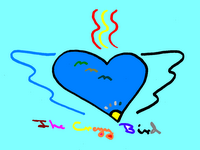It starts with the "mark of Cain" and then asks if there is perhaps another meaning in it for us all and shows that there is often a deeper and yet more obvious meaning in these tales than the obvious one.
I couldn't find a suitable image today, but I did find that the "mark" has by some been considered to be black skin. I know of many perversions of religious teaching in the cause of promoting human suffering, but this came close to shocking me.
God sends him away to live in pain_____________________
with a mark upon his brow, the mark of his deed,
the memory of the brother he had slain...
"Am I my brother's keeper?" The question gives seed
for thought, does it not?
Perhaps there is a thought,
some subtle message hidden between the lines?
There often is, you know, and preachers ought
to tell you more about them, like the time
Jesus tells the lady at the well
that she has five "husbands"*, that is, "baal",
which means "lord" or "master". Is he trying to tell
us we're slaves to our senses -- is that all!
Are we our brothers' keeper -- and our sisters' too?
We care for, or kill them in all we say and do!**
* "Five husbands" (John, 4, 18). The reference to five "masters" should not be taken only literally. Always we must ask ourselves, "Why this particular story or saying? Why was this included?" The answer is, "Because it in some way or other it throws light upon the Gospel, revealing an aspect of the Christian Vision.".
** The interested reader should also read closely L. Cohen's "Story of Issac", in particular the lines near the end, "When you call me brother...according to whose plan?..." -- The closing couplet of this poem refers to Cohen's song.




No comments:
Post a Comment